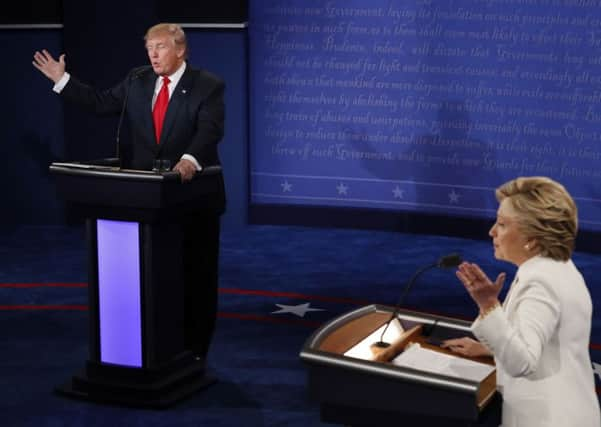Bill Carmichael: Trump and Clinton, the worst presidential candidates in history


But what happens if you are neither?
The thought struck me watching the unedifying spectacle of the final US Presidential debate between Donald Trump and Hillary Clinton that took place in the early hours of yesterday morning.
The excerpts I watched weren’t so much highlights as lowlights, with a degree of nastiness and personal attacks that – even in the rough and tumble of politics – we have rarely witnessed in the past.
Advertisement
Hide AdAdvertisement
Hide AdHas there ever been two more deeply unimpressive and unlikeable people vying for the most powerful job in the world?
Trump was full of his usual bluster and swaggering aggression, while Clinton was pinched, peevish and almost overwhelmed by her own sense of entitlement.
Neither seemed driven by any guiding political principle beyond personal ambition.
We can only hope that whoever wins – and Clinton remains the hot favourite with less than three weeks to election day – will grow into the job, because currently the signs are far from good.
Advertisement
Hide AdAdvertisement
Hide AdPoliticians across the political spectrum tend to have enormous egos, but we like our leaders to have a smidgeon of humility – or at least be a good enough actor to appear to have it. In this debate that was in very short supply.
Likeable? Well, let’s put it this way – you couldn’t imagine for a moment having a convivial coffee or a beer with either of them. If they turned up at your local, the regulars would all be abandoning their pints and running for the exits.
But does it matter? Do political leaders need to be likeable? The evidence is mixed. Ronald Reagan was an immensely likeable character with bags of old world charm and a sunny disposition, and he turned out to be one of America’s most successful and effective leaders.
In contrast Barack Obama, although no doubt likeable and apparently a good companion for a round of golf, has proved to be an unmitigated disaster, particularly in the field of foreign affairs.
Advertisement
Hide AdAdvertisement
Hide AdSo likeability is not a reliable guide to the effectiveness of a leader – but what about Machiavelli’s fear factor?
A previous US President, Theodore Roosevelt, characterised his foreign policy as “speak softly and carry a big stick”, and this approach has served the world well, with American power helping to defeat both the Nazis and the Soviets and liberating millions from slavery under fascism and communism.
But American power is now much diminished, with Obama content to “lead from behind”. His weakness over Syria could be characterised by the saying “boast loudly, but carry no stick at all to back it up”.
From the look of the current presidential contenders, this is unlikely to change. It is hard to imagine Vladimir Putin or Bashar Assad quaking in their boots at the thought of a President Clinton or a President Trump. The Russians are not likely to be forced to stop bombing civilians in Syria any time soon.
Advertisement
Hide AdAdvertisement
Hide AdOne comment from Trump did, however, stand out and sent a shiver down my spine – when he suggested he may not accept the election result should he lose.
The convention in Western democracies is that no matter how bitter the election battle, once the votes have been counted everyone accepts the result as the democratic will of the people.
But now we have Trump already suggesting some kind of conspiracy is robbing him of victory.
We have seen this before of course. In 2000 many die-hard Democrats refused to accept George W Bush’s defeat of Al Gore over the long-running “hanging chad” controversy.
Advertisement
Hide AdAdvertisement
Hide AdAnd sadly, we have seen something similar in the UK over recent months with several senior politicians suggesting the democratic vote of 17.4 million to leave the EU in the June referendum should simply be ignored.
This is dangerous, anti-democratic stuff – because it undermines the integrity of the entire system.
People’s faith in democracy is already at a low ebb – and anything that threatens if further should simply not be countenanced.